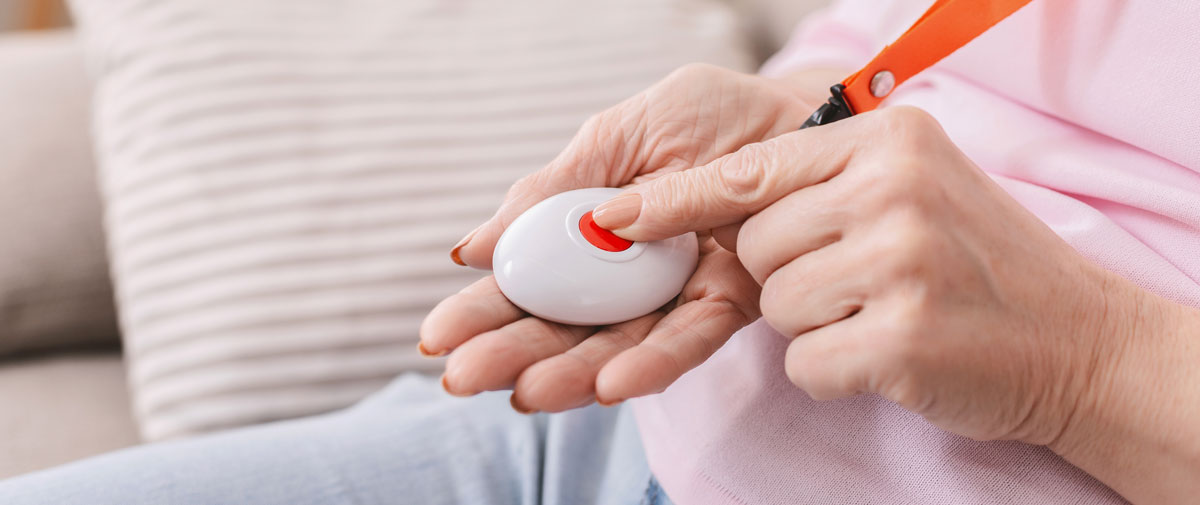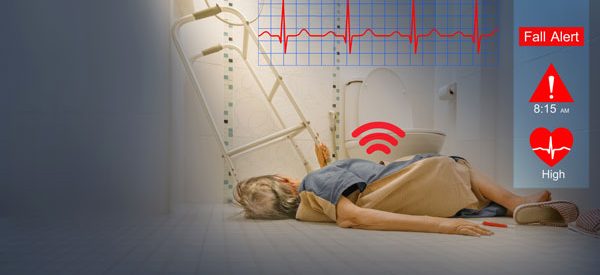
Pros and Cons of Monitored vs Non-Monitored Panic Buttons

Panic Buttons, Medical alert systems, and Personal Emergency Response Systems all mean the same when it comes to personal safety and security.
Providers may call them by different names but they all work to give one thing – an easy way to summon help in an emergency by pushing an emergency button.
They also come in different shapes and sizes- from watches, wristbands, pendants, wall buttons, etc. You can definitely find the best device that matches your needs.
Before you start shopping for the best panic button for you or a loved one, you will also need to consider whether you want a monitored or non-monitored panic button. We have taken the time to present to you below the distinctions and the pros and cons of these 2 choices to guide you.
When you feel ready to compare and choose the right panic button, just fill out the form on this page to receive FREE and NO OBLIGATION quotes!
Who needs a panic button?

Have you experienced a medical scare before? Would you like to be proactive and make sure you have access to emergency services at home?
People who live alone, especially older adults, would benefit greatly from a medical alert system with a panic button.
We never know when an emergency would come up, especially accidents or medical problems that require immediate help.
This is why medical alert systems for seniors have become so popular nowadays, being that many of them want to live independently but don’t have a 24/7 care or support system.
Medical alert systems or panic buttons are ideal for several types of individuals as follows:
- Seniors living alone
- Seniors with Alzheimer’s or Dementia
- Older adults with a history of falls or a fear of falling
- Patients recovering from an injury or surgery
- Persons with medical conditions such as Epilepsy, Parkinson’s Disease, Heart Disease, Stroke, Hypertension, etc.
- Children with special needs
As you can see, medical alert systems are not only for seniors. They can be useful for people who may find themselves in a dire situation and need to call for emergency services. You don’t always have a phone in hand or you may not be capable of placing a phone call.
A simple press of a panic button can save a life!
Within seconds, a trained responder from a qualified monitoring center will receive the alert and call the fire or police department or an ambulance to the scene.
Is a medical alert system only for medical emergencies?
Medical alert systems can be used for any emergency, even if they are non-medical. Examples of then a medical alert system can be used to call for help:
- Burglary in progress or the user wants to call the police
- You are locked out of the house and need to contact a relative
- The user is disoriented and doesn’t know his location
- You want to summon the fire department
- You need an ambulance
- The user needs a family member to help with something such as food, getting dressed, etc.
As you can see, the monitoring center can assist in all types of emergencies, even if they are not medical. Some users of medical alert systems are seniors with mobility issues and can’t always get on the phone.
For this reason, a medical alert system works better in an emergency than a smartphone because it only takes 1 press of a button.
Compare Monitored and Non-Monitored Panic Buttons
When considering a medical alert system, you will be faced with the choice between a monitored or a non-monitored system. How are they different?
Non-monitored medical alert systems or panic buttons have no monthly fees. Thus, they are the cheapest in the market.
When you get a non-monitored panic button, you have to buy the device. Any alert is sent to a designated contact (relative, friend, neighbor) who will then respond to the emergency or call the necessary responders (police, fire, ambulance).
When you get a monitored panic button, you can buy the device or rent the device, depending on the options from your chosen provider. There are monthly monitoring fees and one-time charges for activation or installation.
|
|
|
|
|
|
|
|
|
|
|
|
|
|
|
|
|
|
|
|
|
If you are having a hard time deciding whether to get a monitored or non-monitored system, consider the following:
- Does the intended user live alone?
- Who will receive the alert?
- Is the designated contact available to respond to an emergency notification quickly and at all times?
- Does the user have a history of falls?
- Can the designated contact arrive at the location fast?
If the user lives alone and has a history of falls, a monitored system is recommended to ensure immediate help. Monitored systems offer auto fall detection which alerts the monitoring center in the event of a fall, even if the user did not press the button.
If the designated contact lives far away or is not always available to receive or react to emergency notifications, a monitored system is also recommended.
It is important to note that non-monitored systems don’t offer any emergency support services. The features of these devices are also few, usually just a panic button to press in an emergency.
On the other hand, monitored systems offer additional features such as automatic fall detection, GPS tracking, medication reminders, and geo-fencing.
Compare Monitored and Non-Monitored Panic Buttons

We have briefly mentioned some features offered by monitored medical alert systems. Now, let’s go into more details to see how they can benefit you.
Fall detection
Automatic fall detection has advanced in recent years to the point that it is more than 90% reliable.
When we speak of fall detection, it means the device can identify a fall and alert a monitoring center even if the user does not press the panic button after a fall.
How is this possible?
Companies use different technologies but they all have parameters that are used by the system to differentiate normal movement from a fall. For instance, the speed of movement and the final position of the user can tell a fall from a normal activity such as sitting down or lying down.
The Centers for Disease Control and Prevention say that 1 out of 4 older adults experiences a fall each year. 20% of these falls are serious, with injuries that range from head trauma to broken bones.
In a serious fall situation, a senior may be on the floor for hours or days without receiving medical assistance. This can lead to more serious complications.
In less serious falls, older adults may be unable to get up to call on the phone for help.
With a medical alert system with automatic fall detection, a senior can have 24/7 protection, 365 days a year, with guaranteed access to emergency services at all times.
GPS Tracking
Several reliable medical alert system companies offer GPS and cellular triangulation to track a user’s location in an emergency.
The monitoring center can access the user’s profile and a send notification to family members and summon emergency services to the user’s location.
GPS technology can prevent wasting precious moments in looking for a loved one who may get lost or wander off because of his medical condition such as Alzheimer’s or Dementia.
Medication reminder
Medications are important to stabilize a patient’s condition and for pain management. It is not uncommon, however, for seniors to forget to take their medications on time and at the right dosage.
Some medical alert systems offer this additional feature to augment the care of a loved one. This way, medications can be taken on time even in the absence of a full-time caregiver.
Geo-fencing
Geo-fencing is another advanced technology for wireless systems which allows caregivers to establish “safe” zones for the user. When they leave a “safe” zone, a notification is sent that the user could be at risk.
Medical alert systems improve the quality of life of caregivers and seniors

According to the Alzheimer Society of Canada, over 500,000 Canadians suffer from dementia. They can get disoriented and wander off, leading to a constant state of anxiety for their families. If they are not found quickly when this happens, they can easily come to harm.
With medical alert systems, individuals with serious medical conditions can be safer and more comfortable, even when they are alone. At the same time, their caregivers can have peace of mind and take some time off to rest or relax without constantly worrying about a loved one. A medical alert system can help them stay connected with a loved one at home and benefit from important technologies such as:
- Real-time GPS tracking
- Fall detection
- Instant notification to family members
- Emergency panic button
- 24/7 Live Monitoring Center
As you can see, a reliable emergency panic button from a medical alert system can greatly improve the quality of life of both the user and the caregivers.
For a reasonable investment, you can have peace of mind that your loved one is safe at home with access to emergency services at all times.
Are non-monitored medical alert systems reliable?
For individuals who want a medical alert system with no monthly fees, you can find a few options in the market.
They all come with a portable or wearable alarm button that will send a text notification to your caregiver or designated contact. These systems can also send someone a call from a list of contacts on the account, including 911.
An account can have as many as 10 contacts on the list. In an emergency or alert, the system dials each number until someone answers. The user can then speak with the other party.
Systems vary in function and cost and their reliability depends on two things- the user has the panic button on hand and the emergency contact responds to the alert promptly.
Thus, the reliability of a non-monitored medical alert system is not as high as a monitored one. Most non-monitored systems don’t provide automatic fall detection. The user will need to press the button to send the alert.
How much do you pay for a reliable panic button?
The cost of an emergency panic button or a medical alert system varies from one company to another. It will depend on the type of device you choose – home-based or wireless, the features you want (basic panic button, with fall detection, with GPS monitoring, etc.), installation and activation, and the monitoring fees.
Companies have varying fees associated with their service. You can find a table of comparison below to guide you.
|
| ||||
|
|
|
|
|
|
|
|
|
|
|
replaceable battery |
|
|
|
|
|
|
|
|
|
|
|
|
|
|
|
|
|
36-month contract |
|
|
|
|
|
|
|
|
|
|
|
|
These are but some of the medical alert systems that are available in the market. You need to check which ones are suitable to your needs and budget.
Note that not all systems have nationwide coverage so you should also check if they work in your area.
Want to know the price of the best medical alert system for you? Fill out the form on this page and receive FREE and NO COMMITMENT quotes.
How do non-monitored medical alert systems work?
No-monthly medical alert systems usually have 2 components – a wireless pendant or wristband worn by the user and a base station that is plugged into a phone jack.
When there is an emergency, the user must push the emergency button to initiate the call process. Some systems can have as many as 10 contacts while others have until 6. The numbers connect to designated individuals such as family, friends, or neighbors. Each system has a different set of features so it is best to check them before you buy one.
The range covered from the base unit to areas of the home also differs among companies.
For setting-up the system, a caregiver can program the emergency numbers. The system will keep dialing the numbers in sequence until somebody answers.
Non-monitored medical alert systems are attractive to some because they have no monthly fees or long contracts. You will only invest in the equipment which could be from $200 up. Some only dial 911 while others play a recorded message when somebody picks up the phone. Still, others have a speakerphone that allows voice communication between the user and the contact.
Comparing monitored with non-monitored emergency buttons
If you can afford the monthly monitoring fees, it is worthwhile to consider monitored medical alert systems for seniors. They guarantee a response from a real-life trained professional at a certified monitoring center day or night.
On average, the monthly fees only cost about $1 per day which is not expensive when you consider the assurance of being connected to an emergency service quickly. For this small price, seniors can enjoy their independence without compromising their safety.
Another benefit of monitored systems is the fact that they don’t need much maintenance. They also have added layers of protection that are not found in non-monitored systems.
FAQs about Panic Buttons with Monitoring
If you are looking to buy the best panic button with monitoring, you surely have some questions to help you decide.
We have gathered below some frequently asked questions about medical alert systems with 24/7 monitoring to allow you to compare and choose the best one.
How much is the monthly fee for monitored medical alert systems?
You will be surprised to know that the average price for monthly monitoring is only about $1 a day. For additional features like automatic fall detection or GPS tracking, it will cost a little more like around $2 a day or less.
Are there medical alert systems without a long-term contract?
Yes, some medical alert systems have no long-term contract. They can be canceled anytime.
Is automatic fall detection reliable?
Fall detection technology is reliable but it is not 100% accurate. Most systems can accurately identify a possible fall using parameters such as speed, height, and position. An alert is sent to a monitoring center if there is a likelihood of a fall and further verification can be done by the staff. If the user cannot speak or does not respond, they will dispatch help.
Why is a fall detector essential for seniors?
Statistics show that seniors aged 65 and older are at risk for falls every year. Many seniors receive emergency medical attention due to fall-related injuries. A fall detector can get help to a person more quickly after a fall to increase the chance of recovery and prevent further injury.
Can I cancel the monitoring service for my parent’s medical alert system?
If you took out a medical alert monitoring service for your parent and want to cancel, there may be a cancellation fee if the contract is not yet finished. Terms and conditions vary among companies so it is best to check with the company regarding their cancellation policy.
Is it worth paying monthly fees for a medical alert system?
Yes, monitored medical alert systems are the most reliable safety net for seniors living alone or with medical conditions. Caregivers cannot be available 24/7 and, on some occasions, a senior may not be capable of calling for help. A medical alert system with an emergency panic button is the surest way to summon help in an emergency,
What is the best medical alert system in Canada?
There are many good medical alert systems available but not a fit-all-solution for everyone. Your choice needs to be based on the specific needs of the user, your location, your budget, the user’s lifestyle, etc. The best thing to do is to compare several quotes from reliable companies by filling out the short form on this page.
Compare and choose the best panic button for you
Now that you know how important it is to have an emergency panic button for safety and security, it is time to compare and choose the right one for you.
You can choose from a variety of medical alert and personal emergency response systems with wearable emergency panic buttons for your convenience.
You can also choose a medical alert system that covers just the home or wireless systems that protect inside and outside the home.
You can also consider basic plans with an emergency panic button or more sophisticated packages that include auto fall detection, GPS tracking, and geo-fencing.
Fill out the form below to receive FREE and NO COMMITMENT quotes for reliable medical alert systems in your area.
Our partners will be happy to provide you with competitive quotes that suit your needs and budget!
Comments are closed.

Copyright© 2025 Compare Home Quotes.
Oolong Media






